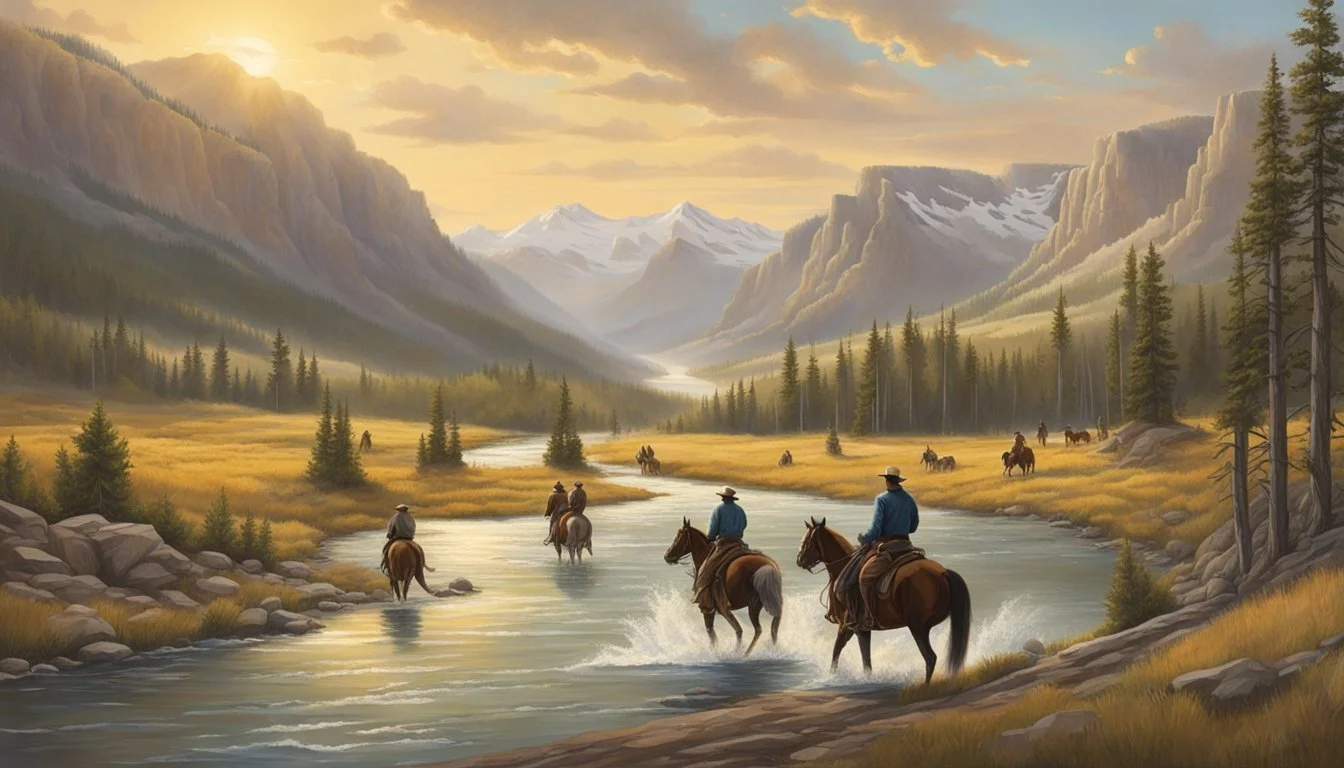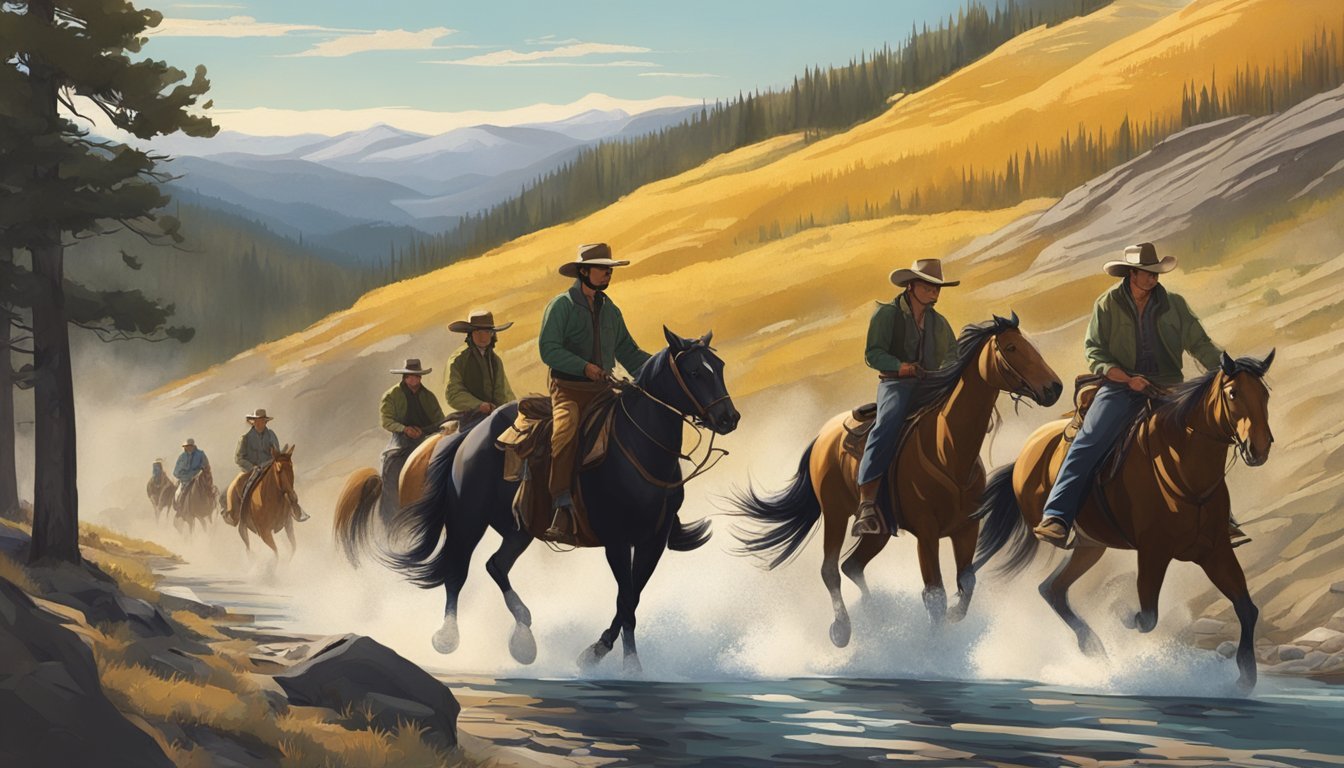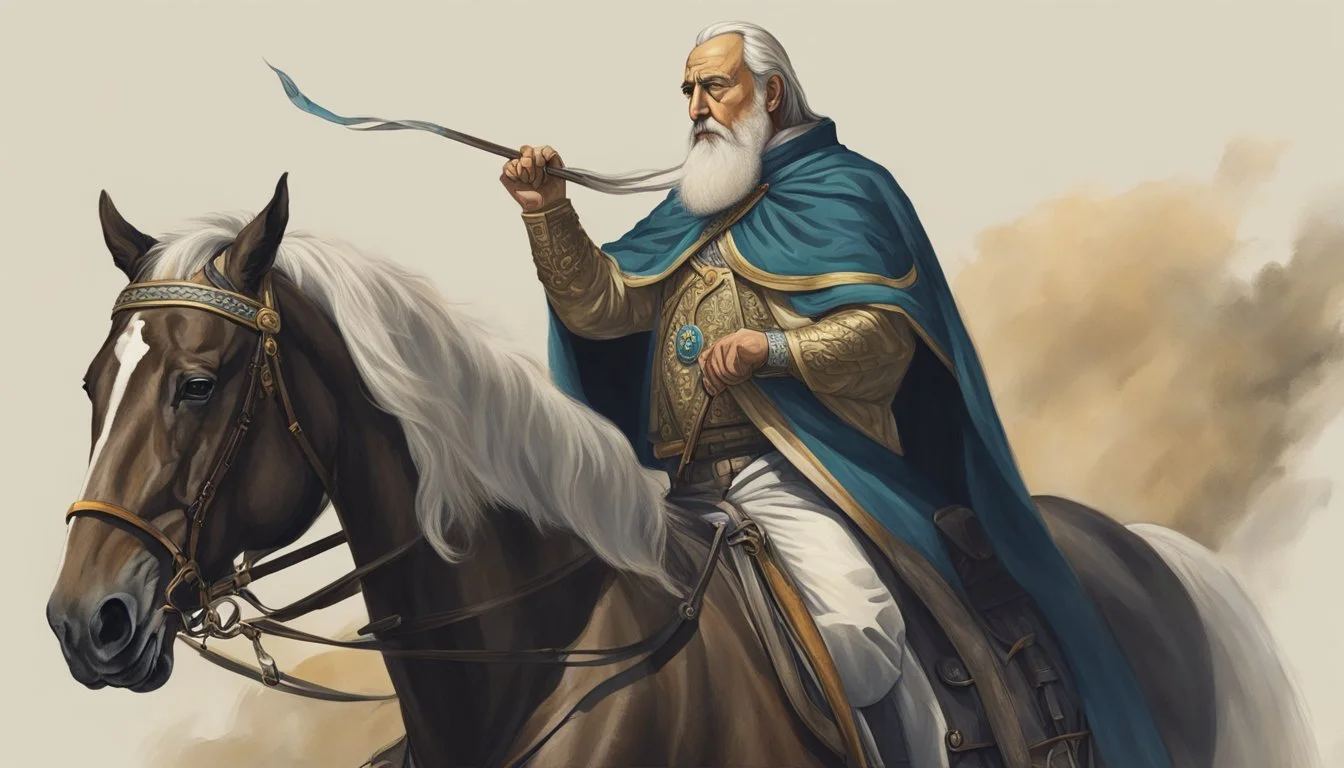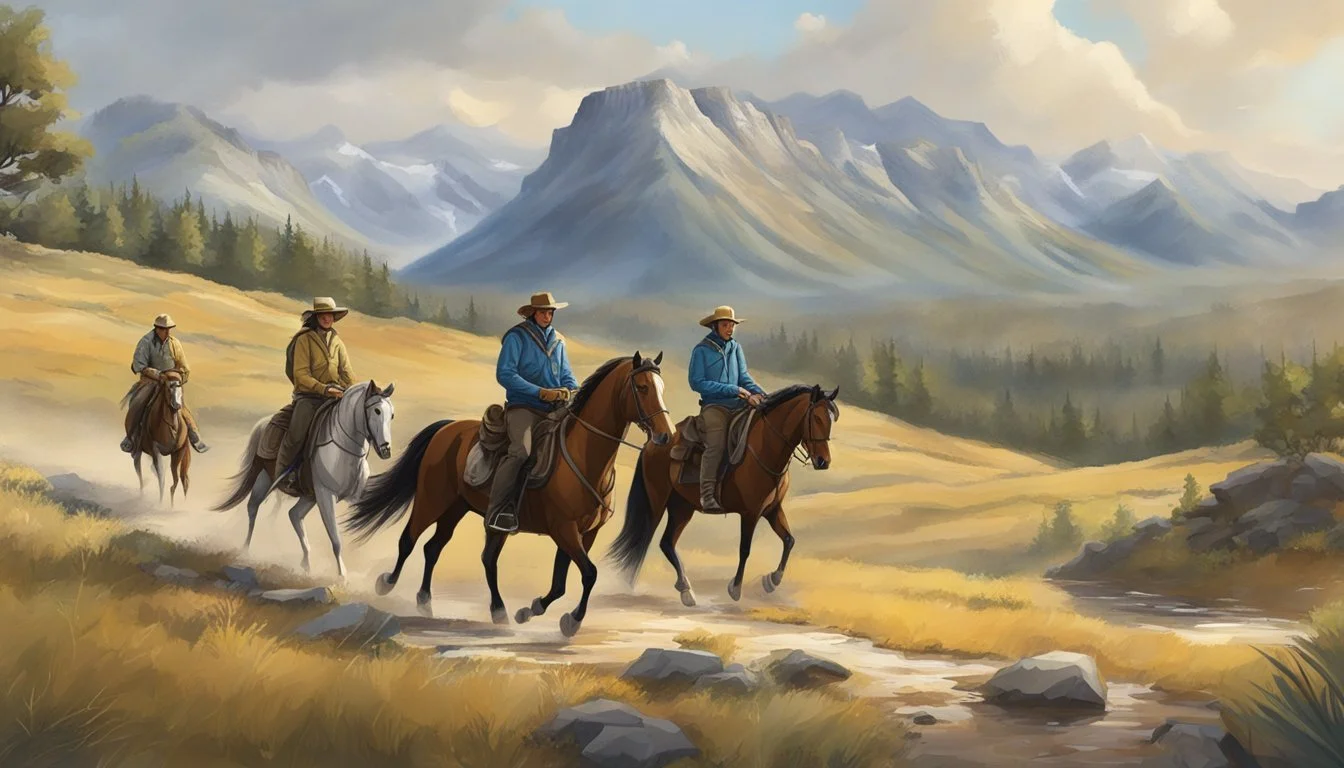Dutton Dynasty Exposed: The Dark Secrets Behind Yellowstone's Patriarchal Power
Yellowstone, the hit television series, has captured America's attention with its portrayal of the Dutton family's struggle to maintain their ranch and way of life. At the center of this gripping drama stands John Dutton, the family patriarch whose leadership embodies traditional conservative values.
The show's depiction of patriarchal power and family loyalty resonates deeply with many American viewers, particularly those who identify with conservative ideals. John Dutton's unwavering commitment to preserving his family's legacy and land reflects a broader cultural narrative about the importance of tradition and self-reliance in rural America.
Yellowstone's popularity stems in part from its authentic representation of complex family dynamics set against the backdrop of a changing West. The Dutton family's internal conflicts and external battles serve as a microcosm for the tensions between traditional values and modern pressures faced by many American families today.
Yellowstone's Backdrop: The American West and Montana's History
Montana's rugged landscape and complex history provide a rich setting for Yellowstone's narrative. The show draws upon centuries of cultural transformation and economic struggles that have shaped the American West.
Historical Influences on Land and Culture
The American West's settlement profoundly impacted Montana's development. Westward expansion in the late 19th century brought waves of settlers to the region. This influx included Confederate veterans seeking new opportunities after the Civil War.
Native American tribes faced displacement as newcomers claimed land. The Bitterroot Valley, once home to indigenous peoples, became a focal point for ranching operations. These land disputes echo in Yellowstone's portrayal of modern conflicts.
Montana's ranching heritage emerged during this period. Large cattle operations took root, laying the groundwork for the state's agricultural identity. The harsh climate and vast open spaces fostered a culture of resilience among ranchers.
Montana Ranch: A Symbol of Resilience
Montana's ranches have weathered significant challenges throughout history. The Great Depression hit rural Montana hard, forcing many families to adapt or abandon their land. Those who persevered became symbols of tenacity.
Ranches like the fictional Dutton property in Yellowstone represent this enduring spirit. They stand as testaments to generations of hard work and determination. These sprawling estates often serve as more than just agricultural operations.
Many Montana ranches have diversified to survive changing economic landscapes. Some have embraced tourism, offering glimpses into the cowboy lifestyle. Others have incorporated conservation efforts, balancing land use with environmental stewardship.
Yellowstone National Park's proximity adds another layer to the region's complexity. The park's establishment in 1872 forever altered the relationship between humans and nature in Montana. It continues to influence local culture and economy today.
The Dutton Legacy: From James to John Dutton III
The Dutton family's journey from pioneer settlers to modern-day ranching empire spans generations, marked by fierce loyalty, struggle, and a deep connection to the land. Their story reflects the evolution of the American West and the enduring power of family legacy.
Dutton Family: Generational Narratives and Conflicts
James Dutton, a Civil War veteran, laid the foundation for the Dutton legacy in 1883. He led his family westward to establish what would become the Yellowstone Dutton Ranch. This pivotal decision shaped the family's future for generations to come.
John Dutton III, the current patriarch, stands as the culmination of the family's struggles and triumphs. He fiercely protects the ranch and family legacy, often at great personal cost. His children - Beth, Jamie, and Kayce - embody different aspects of the Dutton spirit, each grappling with their roles and responsibilities.
The family's story is one of perseverance against challenges, from harsh frontier conditions to modern threats like inheritance taxes and land developers. Each generation faces unique conflicts, testing their resolve and commitment to the Dutton name.
Patriarchal Code and Family Dynamics
The Dutton family operates under a strong patriarchal code, with male figures traditionally holding power and making key decisions. This structure influences family dynamics and individual roles within the clan.
John Dutton III embodies the traditional masculine ideals of strength, honor, and unwavering dedication to family and land. His leadership style often clashes with modern sensibilities, creating tension within the family and with outsiders.
Family loyalty is paramount in the Dutton world. Members are expected to prioritize the ranch and family interests above personal ambitions. This expectation shapes the paths of Beth, Jamie, and Kayce, sometimes leading to internal conflicts and difficult choices.
The ranch itself serves as a symbol of Dutton power and a physical manifestation of their legacy. Its preservation becomes a driving force, influencing decisions and relationships across generations.
Sociopolitical Landscape: Power Struggles and Conservation
The Yellowstone series portrays complex power dynamics and land conflicts in rural Montana. These struggles intertwine issues of land ownership, political influence, and conservation efforts.
Duttons vs. Developers: The Battle for Land Ownership
The Dutton family fiercely defends their vast ranch against encroaching developers and corporations. This conflict represents broader tensions between traditional ranching culture and modern economic pressures.
John Dutton leverages political connections and legal maneuvers to protect his land. He faces ruthless adversaries like Dan Jenkins, who seek to transform the area into lucrative tourist destinations.
The show highlights the cultural significance of ranching families and their deep-rooted connection to the land. It explores how these families navigate changing economic landscapes while striving to preserve their way of life.
Land preservation becomes a central theme, with the Duttons positioning themselves as stewards of Montana's natural beauty. This stance resonates with viewers concerned about environmental conservation and resource management.
Political Dynamics and Native American Tribes
Yellowstone delves into the complex relationship between ranchers, local government, and Native American tribes. The Broken Rock Reservation, led by Thomas Rainwater, emerges as a powerful entity in the region's political landscape.
Rainwater's character embodies the struggle for Indigenous rights and land reclamation. He engages in strategic alliances and conflicts with the Duttons, showcasing the intricate power dynamics at play.
The series explores how historical injustices and current legal frameworks shape interactions between Native American tribes and other stakeholders. It depicts the ongoing challenges faced by Indigenous people in asserting their rights and preserving their cultural heritage.
Political corruption and backdoor dealings feature prominently, revealing how various factions manipulate the system to advance their interests. This portrayal sheds light on the often murky intersection of politics, business, and land rights in rural America.
Cultural Reflections: Patriarchal Values in Modern Westerns
Yellowstone's portrayal of patriarchal power structures offers a window into conservative American family values. The show's immense popularity has sparked discussions about masculinity, family dynamics, and traditional Western ideals in contemporary society.
Yellowstone as a Cultural Phenomenon
Yellowstone has become a cultural touchstone, captivating millions of viewers across the United States. The series, created by Taylor Sheridan, taps into a nostalgic yearning for the rugged individualism of the Old West.
Kevin Costner's portrayal of John Dutton embodies the archetypal patriarchal figure, resonating with audiences who admire strong, authoritative leadership. The show's success on Paramount+ has reinvigorated interest in modern Westerns and ranch life.
Yellowstone's impact extends beyond television, influencing fashion trends and sparking debates about land ownership and preservation. Its popularity has led to spin-offs and merchandise, cementing its place in popular culture.
Masculinity and Power in Family Structures
The Dutton family dynamics in Yellowstone showcase traditional patriarchal power structures. John Dutton's iron-fisted rule over his children and ranch reflects deeply ingrained notions of masculine authority.
This portrayal has sparked discussions about toxic masculinity and its role in family hierarchies. The show presents a complex picture of power and control, where loyalty to family often trumps individual desires.
Yellowstone's female characters, while strong, often operate within the confines of patriarchal expectations. This tension between modern sensibilities and traditional values creates a compelling narrative that resonates with many viewers.
The series prompts reflection on the evolution of family structures in American society and the enduring influence of patriarchal ideals in certain cultural contexts.
Character Studies: Morality and Loyalty within the Dutton Circle
The Dutton family's inner circle exemplifies complex moral codes and unwavering loyalty. These characters navigate ethical dilemmas while fiercely protecting their own.
Beth Dutton: Loyalty Fueled by Resilience
Beth Dutton's loyalty to her family is a driving force in Yellowstone. Her sharp wit and ruthless tactics stem from a deep-seated need to protect the Dutton legacy.
Beth's resilience is evident in her ability to overcome personal traumas. She channels her pain into fierce dedication to her father's cause.
Her relationship with Rip Wheeler showcases a softer side of her loyalty. Beth's love for Rip demonstrates her capacity for genuine connection amidst the family's turmoil.
Despite her often morally ambiguous actions, Beth's loyalty to the Duttons remains unshakeable. She willingly crosses ethical lines to ensure her family's survival and prosperity.
Rip Wheeler: The Embodiment of Family Loyalty
Rip Wheeler's devotion to the Dutton family defines his character. As John Dutton's right-hand man, Rip embodies unwavering loyalty and a steadfast moral code.
His troubled past and subsequent adoption by the Duttons shape his sense of duty. Rip's gratitude manifests in his willingness to do whatever is necessary to protect the ranch.
Rip's relationship with Beth adds depth to his character. Their bond illustrates how loyalty can extend beyond blood ties to create powerful family connections.
His role on the ranch often requires him to make difficult moral choices. Rip's actions, while sometimes brutal, are always in service of the greater good as defined by the Duttons.
The Significance of Land: Environmental and Cultural Preservation
Land holds immense value in Yellowstone, both environmentally and culturally. It represents a delicate balance between preserving natural ecosystems and maintaining traditional ways of life.
Ranch Life vs. Modern Development
The tension between ranch life and modern development forms a central conflict in Yellowstone. Traditional ranches like the fictional Dutton Ranch face pressure from developers seeking to transform the land. These developers often envision luxury resorts, golf courses, and high-end housing developments.
Ranchers view their land as a legacy, passed down through generations. They see themselves as stewards of the landscape, maintaining its natural beauty and ecological balance. This perspective clashes with the profit-driven motives of developers.
The Chief Joseph Ranch, which serves as the set for the Dutton Ranch, embodies this struggle. Its real-life owners work to preserve the property's historic character while adapting to modern economic realities.
Wildlife Protection and the Role of Yellowstone Park
Yellowstone National Park plays a crucial role in wildlife protection and conservation efforts. As America's first national park, it sets a precedent for balancing public access with environmental preservation.
The park provides vital habitat for iconic species such as wolves, bison, and elk. These animals require vast, uninterrupted territories to thrive. Their presence often conflicts with ranching and development interests outside the park boundaries.
Yellowstone's management faces ongoing challenges in maintaining ecological integrity while accommodating millions of visitors annually. Park officials must navigate complex issues like wolf reintroduction, bison migration, and the impact of climate change on local ecosystems.
The Evolution of Ranching: From Tradition to Modern Stakes
Ranching in the American West has undergone significant transformations since its inception. The industry faces new challenges as it adapts to economic pressures and technological advancements while striving to maintain traditional values and practices.
Economic Pressures and the Reality of Ranching Today
Modern ranchers confront a complex economic landscape. Rising costs of land, equipment, and livestock have squeezed profit margins. Many ranches struggle to remain financially viable in the face of volatile cattle prices and increasing competition from large-scale operations.
Climate change has introduced new uncertainties, affecting grazing lands and water resources. This has forced ranchers to adopt more sustainable practices and diversify their income streams.
Technological advancements have revolutionized ranch management. GPS tracking, drones, and data analytics now play crucial roles in herd management and land use optimization. These tools improve efficiency but require significant investment and adaptation.
Adapting to Change: The Duttons' Struggle for Survival
The Dutton Ranch in Yellowstone exemplifies the challenges faced by modern ranching families. John Dutton's efforts to preserve his family's legacy highlight the tension between tradition and progress.
The Duttons navigate complex legal and political landscapes to protect their land from developers and corporate interests. This struggle reflects the real-world pressures many ranchers face as urban expansion encroaches on rural areas.
To survive, the Duttons employ a mix of traditional ranching knowledge and modern business strategies. They diversify their operations, engage in strategic partnerships, and leverage their political connections.
The family's commitment to self-reliance and rural values clashes with the realities of 21st-century commerce. This tension drives much of the drama in Yellowstone, mirroring the real-life challenges of maintaining ranching culture in a rapidly changing world.
Yellowstone's Influence: Legacy Beyond the Screen
Yellowstone has transcended its status as a television show to become a cultural phenomenon, shaping perceptions of the American West and conservative values. Its impact extends far beyond entertainment, influencing fashion, tourism, and social discourse.
The Show's Reflection on American Conservative Family Values
Yellowstone portrays a traditional patriarchal family structure, embodying conservative ideals of loyalty, legacy, and land ownership. The Dutton family's struggle to maintain their ranch reflects broader anxieties about preserving cultural identity in a changing world.
John Dutton's leadership style emphasizes strength and decisiveness, resonating with viewers who value traditional masculinity. Beth Dutton, played by Kelly Reilly, presents a complex female character who balances career ambition with fierce family loyalty.
The show's depiction of prohibition-era values in a modern setting highlights the tension between tradition and progress. This portrayal has sparked discussions about the role of conservative values in contemporary America.
Yellowstone's Echo in Modern America
Yellowstone's popularity has led to a surge in Western-inspired fashion and increased tourism to Montana. Cowboy hats, boots, and rugged outdoor wear have seen a resurgence in popularity among fans seeking to emulate the show's aesthetic.
The series has reignited interest in ranch life and land conservation issues. It has brought attention to the challenges faced by rural communities, including land development pressures and economic struggles.
Yellowstone's exploration of power struggles between landowners, Native American tribes, and government entities has prompted viewers to consider complex issues of land rights and cultural preservation.
The show's spin-offs have expanded its cultural footprint, creating a shared universe that continues to explore themes of family, legacy, and the American West.





